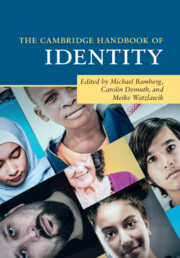Book contents
- The Cambridge Handbook of Identity
- The Cambridge Handbook of Identity
- Copyright page
- Contents
- Figures
- Tables
- Contributors
- 1 Identity: With or Without You?
- Part I The Origin and Development of the Concept of Identity
- Part II New Perspectives and Challenges
- Part III Methodological Approaches
- Part IV Current Domains
- 21 Critical Perspectives in Clinical Psychology: Autistic Identities
- 22 Gerontopsychology: Dementia and Identity
- 23 The Study of Identity in Health Psychology
- 24 Identity Scholarship in Educational Psychology: Toward a Complex Dynamic Systems Perspective
- 25 Political Psychology: Identity Development in a Traumatic Environment
- 26 Organizational Psychology: When, Why, and How Is Identity Work (Less) Important in Organizational Life?
- 27 Conceptualizing the Multiple Levels of Identity and Intersectionality
- Part V Where Is Identity?
- Author Index
- Subject Index
- References
22 - Gerontopsychology: Dementia and Identity
from Part IV - Current Domains
Published online by Cambridge University Press: 29 October 2021
- The Cambridge Handbook of Identity
- The Cambridge Handbook of Identity
- Copyright page
- Contents
- Figures
- Tables
- Contributors
- 1 Identity: With or Without You?
- Part I The Origin and Development of the Concept of Identity
- Part II New Perspectives and Challenges
- Part III Methodological Approaches
- Part IV Current Domains
- 21 Critical Perspectives in Clinical Psychology: Autistic Identities
- 22 Gerontopsychology: Dementia and Identity
- 23 The Study of Identity in Health Psychology
- 24 Identity Scholarship in Educational Psychology: Toward a Complex Dynamic Systems Perspective
- 25 Political Psychology: Identity Development in a Traumatic Environment
- 26 Organizational Psychology: When, Why, and How Is Identity Work (Less) Important in Organizational Life?
- 27 Conceptualizing the Multiple Levels of Identity and Intersectionality
- Part V Where Is Identity?
- Author Index
- Subject Index
- References
Summary
Dementia questions many ideas about identity due to the fact that dementia, especially Alzheimer’s disease, affects episodic and autobiographical memory. The individual will “lose” self-knowledge and thus the sense of personal continuity and sameness over time. This led to the notion that persons with dementia could be seen as empty vessels – void of any self or identity. Starting in the 1990s a number of researchers began to argue that persons with dementia still had an identity and sense of self. New ideas of what identity and sense of self might mean both theoretically and empirically in the field of dementia were introduced. In this chapter the focus is on three of the attempts to formulate new theoretical views of dementia and identity: (1) social psychological theories based interactional aspects of identity in dementia (Kitwood, Sabat, Harré); (2) theories about stories and storytelling in dementia as an important way to present and negotiate identity (Marie Mills, Cheston, Hydén and others; and (3) phenomenological theories about embodied self and identity (Kontos and others). The common denominator of these three views on identity and dementia is the notion that persons with dementia are still meaning-constructing persons, even very late in the dementia process. Although persons with dementia will over time become increasingly challenged as conversationalists and storytellers, they are still active meaning-makers. They are obviously still engaged in the never-ending activity of making sense of their social as well as physical world-events and happenings in the world as well as what people are saying and doing.
- Type
- Chapter
- Information
- The Cambridge Handbook of Identity , pp. 487 - 507Publisher: Cambridge University PressPrint publication year: 2021

